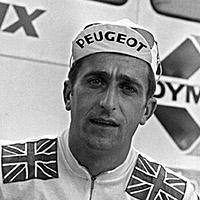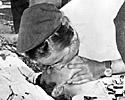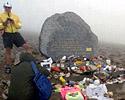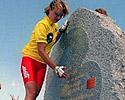
Recently on Cyclingnews.com |
Tales from the peloton, July 21, 2007
Simpson: martyr, example, warning
40 years ago, Tom Simpson became both a martyr of the sport and an example for the antidoping movement. The Tour de France will skirt to the east of the feared Giant of Provence this year, but while it may skip the site of the death of Simpson, events of the past year show that the sport should continue to remember him even if it has failed to heed the warning he provided. Les Woodland recounts the day and the decades since Simpson's death.

|
It was seven in the morning, maybe a little earlier, a little later. Pierre Chany, a French journalist renowned for his closeness to riders such as Jacques Anquetil, was strolling the street outside his hotel. Knowing Chany, he was probably diluting his hangover from the night before.
Some time during his stroll, he met a man called Pierre Dumas, who died about a decade ago, a sick and impoverished man, in the suburbs of Paris. Dumas shook Chany by the hand, sniffed the already warm air, and said, "If the boys stick their nose in a 'topette' today, we could have a death on our hands."
A 'topette' was and perhaps still is cycling slang for a bag of drugs. Chany remembered the conversation until he too died, also around a decade ago, because it came dreadfully true.
The morning was Friday, July 13, 1967, the day before the French national holiday of Bastille Day, and the Tour that afternoon was going over Mont Ventoux. Well, the date is now so enshrined in cycling history that you don't need to be told at length what happened. There is not much more that can be written about how the British rider Tom Simpson, worried that his career was over and his earning power at a low, forced himself over Mont Ventoux and died in the process.
I was 20 at the time and working away from home in Cambridge in eastern England. There were five of us in our office and I had enthused them all about the Tour de France, information about which I scraped from the few paragraphs that appeared in the London press. I remember walking back from where I worked and arriving at my scruffy hotel by the train station just as the television news filled the screen with a black and white picture of Simpson and a voice announced his death.

|
A bunch of salesmen drinking in the bar scoffed when they heard the news and they laughed beerily when one of them added "...and free trouser clips for life."
I felt so offended that I came close to pinning one on them. Instead, I forget what I did but licking my wounds was part of it, because Simpson was not only all British cycling had had - ever - but because his personality and his aggressive riding had taken him that extra step, into near godliness.
You can judge what I mean by "near godliness" when I tell you that even now, four decades later, men of my age who heard the news and felt cheated just as I did still can't bring themselves to say that the man who had done the cheating was Simpson himself. Even if you can wring out an acknowledgement that drugs had been banned in cycling from two years earlier - largely at Dumas's insistence - the defence is that Simpson took them "only because the others took them."
It is a pretty hollow defence, even though it acknowledges that drugs were as cultural to cycling then as they are now, because of course to everyone else, Simpson himself was "one of the others". It is as true to say that Simpson took drugs because of the others as that the others took drugs because of him.
But no matter. What we have in Simpson is not just a tawdry death in the dust of a French gutter, but one that came close to martyrdom. When the journalist Jim Manning first revealed in the London Daily Mail that Simpson was drugged out of his mind, cyclists turned on him either silently appalled that such a thing could be said at all, or with the sort of reaction that a saint might show to a man who has just kicked in a stained-glass window.
Gently, history has been polished. Few other than those who heard the news when it happened now try to deny the blemish of doping. Too much about Simpson's history, and that damning line in a letter that "if ten will kill me then I'll take nine and win", has come to us since.
Instead, Simpson is seen as a sort of cycling bookmark. He is the point at which the story of cycling was supposed to have turned to a fable of moral rectitude. "After Simpson," it's now said, "doping was out in the open and the sport was forced to acknowledge it." His death, said his British team manager Alec Taylor, had forced the authorities to act instead of denying the problem.

|
The trouble with which, of course, is that it was nonsense. There had been many drug scandals before Simpson, including riders collapsing in the Tour de France. Anyone who followed the last hour of a bike race knew that the route stayed visible for long afterwards because the roadside verges were littered with syringes and aluminium foil.
The 1968 Tour, a year after Simpson, started at one of France's most famous sources of sparkling mineral water, a symbol they said of this new "Tour of Health" for which Simpson had paid. Well, they said that again after the Festina scandal in 1998, I remember. And in 2006 the Tour even managed not to have a winner. Other champions between 1998 and then have returned their needle-pocked jerseys, finally blushing at what they'd done in the 'clean, post-Simpson world' of cycling.
High above the tree line in Provence there still stands a roadside memorial where Simpson fell, paid for within weeks by cyclists in Britain responding to an appeal by the editor of Cycling, Alan Gayfer, and his colleague Peter Bryan. It's still moving to see it and riders regularly acknowledge it as they pass in the Tour. Lesser passers, the likes of you and me, stop to pay homage to the fallen and leave whatever they feel best, like an old inner tube or a cap. Just something to placate the gods, to honour the dead.
But the monument is 40 years old. It is shabby and its base is crumbling. It is so much more emblematic of professional cycling than Gayfer and Bryan could ever have guessed. As its base has perished, so clumsy efforts have been made to save it with concrete. The cracks, the holes and the crumbling foundations have been bodged and hidden without any real and lasting effort to mend them.
To this day, nobody knows to whom the monument belongs. Bryan says money came in so quickly that nobody thought to start a formal charity. The local council allowed the land to be used but has no wish to own the statue. People from the nearest town, Bedoin, come up now and then and clear away the rotting tributes when they grow too numerous, but nobody actually owns it and nobody wants it.

|
Simpson is still in that half-world of being sympathised with by many but wanted by nobody.
Which leaves a final thought. Wherever you are, you doubtless find it hard to believe that riders from your own country are as guilty as those from elsewhere. If they - Americans, Australians, Bolivians or Bantus - take drugs, it's "only because everyone else does".
No doubt you have a favourite team, one you think clean. It's impossible to think of your heroes starting the day with a needle in their thigh. But remember the logic of your thinking: it's that your Americans, Australians, Bolivians or Bantus are riding so hard without drugs that the others are having to take them just to keep up.
That's the contorted logic produced by the Simpson faithful. Not only has it been argued for the last 40 years but events of just the last 40 weeks have shown it to be nonsense. Sad, isn't it?
